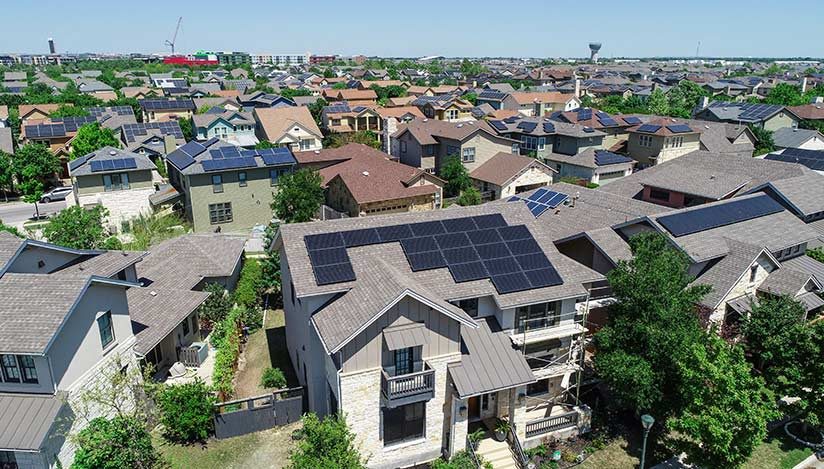Selling Price of Sacramento Homes with Solar Panels Increases by 3 to 7%
In April 2019, online real estate website Zillow released a summary of an analysis of the selling prices of homes with solar power systems versus those with without. They found that homes in the United States with solar power systems sold for an average of 4.1% more than comparable solar-less homes. This translated to a premium of about $9,250 for middle of the road homes.
But Zillow was careful to note that the premium commanded by a home with solar could vary significantly depending on the market. Two examples they highlighted were New York City’s metro area, where homes with solar panels sold for 5.4% more (a median premium of $24,000), while homes in Riverside, California sold for only 2.7% more ($9,930).
The brief article noted two other California markets and their sales price increases:
- San Francisco: 5.4% increase – $41,650 more
- Los Angeles: 3.6% increase – $24,295
But this is also only a single study, and Zillow didn’t release a great deal of detailed information. Many factors may impact how much more homebuyers are willing to pay for a home with a solar power system. They include:
- The baseline market rate for homes in a given community
- The quality of the individual solar power systems
- How effective solar panels are in a given area
- How much the community values solar power.
How might a homebuyer value a solar power system when making an offer price on a home?
A Lawrence Berkeley National Laboratory analysis found that home price premiums for solar power are based on the energy production system, not a home’s base price. System age was also a consideration.
In 2015, Lawrence Berkey National Laboratory analyzed 43 pairs of homes sold in 6 states: California, Florida, Maryland, North Carolina, Oregon, and Pennsylvania. Each pair of homes was carefully matched so that they were highly comparable. The sole significant difference was that one home had a solar power system, and the other did not.
They found that the median average sale price increase for homes with a solar power system was 2.91%. California homes in the San Diego metro area they analyzed were selling for just a hair more on average—2.92%.
But the study noted some very important considerations that home sellers and buyers need to keep in mind. For one, the typical age of solar power systems can vary by reason. The homes in California had solar power systems as old as 11 years in service, with an average age of 4 years. Meanwhile, none of the systems they looked at in Florida were older than 4 years, while those in Pennsylvania were all less than 2 ½ years old. In some respects, solar panels are a depreciating asset, much like a car or a computer. They have a finite lifespan, and their efficiency degrades over time. A homeowner with a 15-year-old system shouldn’t expect the same price bump that a home with a 3-year-old system would get.
The study also pointed out that trying to anticipate the price premium for solar power based upon the value of a home was a flawed idea. After all, a $300,000 home might have a premium quality 6-kilowatt system, versus a lower-end 3-kilowatt system on a $600,000 home. Why would a homebuyer pay twice as much for the smaller system just because the home’s base price is twice as much?
Instead, Lawrence Berkeley stated:
“Price per watt is the appropriate metric for valuing [solar power] systems, not the premium as a percentage of the home sale price, which is an inconsistent metric that varies widely by the size of PV systems and the price range of homes.”
In their study they found that the average price premium for solar power homes in California was between $4,260 per kilowatt. For the rest of the United States, the average price bump was about $3,145 per kilowatt.
But what kind of premium can Sacramento homebuyers and sellers expect when a home has solar?
The Zillow and Lawrence Berkley studies looked at California homes, but unfortunately neither had any information about our local Sacramento housing market. But thankfully, economists at the National Bureau of Economic Research examined the Sacramento region in a 2011 paper titled, “Understanding the Solar Home Price Premium.” In it, they examined the more than 90,000 home sales that occurred in Sacramento County between January 2003 and November 2010, including the 620 homes which at the time had solar power systems.
Unlike Lawrence Berkeley, they did not have information on the energy production of the solar power systems. Instead, they simply compared sales prices of comparable homes, and found that on average homes in Sacramento County with solar power systems sold for 4% more than those without. However, they found some interesting trends as well:
- Solar-powered homes on streets with at least two homes next to each other with solar panels (which they termed “solar streets”) sold for only 3% more.
- Solar-powered homes not on solar streets sold for 7% more.
- Solar homes in San Diego neighborhoods with more college graduates and higher ownership of hybrid vehicles enjoyed a larger price bump than average.
But again, there are many factors to consider before trying to estimate how a solar power system “should” affect a home’s price. Buyers and sellers may have different perspectives on the value of a home’s solar power system. Sacramento appraiser Ryan Lundquist has noted some common issues that come up when appraising solar-powered homes in Sacramento, and how that valuation is affected by solar power systems:
- Recouping investment: Homeowners often want to get back what they paid for a solar power system, or some specific fraction of that. But the purchase price doesn’t determine current worth, especially with older systems that were often much more expensive than comparable systems today.
- Age: Older systems have typically experienced more wear and tear than newer systems, and would be expected to have a shorter lifespan and produce less energy savings than a newer system.
- Actual cost: If the original homeowner received a large rebate on a system, then the original sticker price is significantly different than what they actually paid. Which figure will a homebuyer consider?
- Time in home: Someone selling a home may tell a buyer that they’ll save $15,000 on their power bill over the next 10 years thanks to the solar power system (and so the buyer should pay some percentage of that figure). But what if the prospective buyer only plans to live in the house for 5 years?
An additional issue comes up when a home has a leased solar power system installed. The owner may believe that their leased solar power system is a feature, and should increase the price of their home. But the homeowner doesn’t actually own the system, and will be a financial commitment for whoever buys their home. In some cases, people selling their homes may have to consider paying off their lease in full in order to ensure that their home sale goes through.
While there are many things to consider when buying or selling a home with solar panels, there is a clear consensus among many experts: that when you own a solar power system, you don’t just enjoy energy savings. Your home is worth more too.

